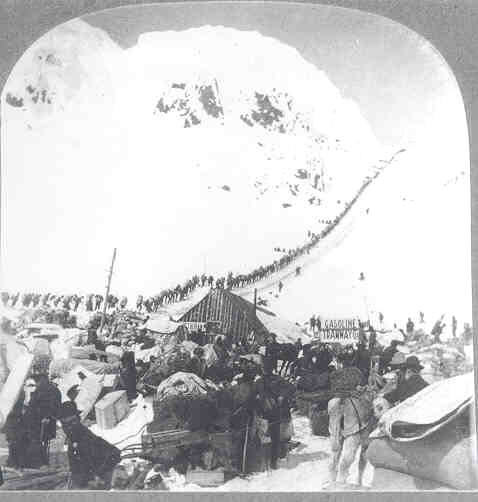
Photo courtesy of David Sundman
"Gold fever" struck people across the United States and around the world. While promoters in both Vancouver, British Columbia and Tacoma, Washington hoped to lure northern-bound stampeders, it was Seattle, Washington which was the most successful at promoting itself as the best departure point for the Klondike. Within days, the city was flooded with stampeders. Ships bound for Alaska were grossly over-booked. Leaky, outdated vessels were pushed into service, taking on as many prospectors as could be crammed aboard.
Of the thousands clamoring to get to the Klondike, few really understood how difficult the journey would be. Most knew better than the man from Chicago who asked a Seattle station attendant for directions to the train to Skagway, which was hundreds of miles away and accessible only by boat.
Skagway, Alaska was one of a number of "jumping off" points for the Klondike. Those who sought advice on the best route to choose were overwhelmed by the dozens of articles, books, guides, maps and pamphlets that flooded the market. Clarity turned to chaos as publishers desperate to cash in on the rush hurried to print using rumors and guesswork instead of reliable information.
Many of the early stampeders were tragically ill prepared for their dangerous odyssey. They carried few supplies and brushed aside warnings of doom. Sadly, some of the poorly outfitted voyagers died of exposure or starvation. The North West Mounted Police responded to that loss of life by insisting that every stampeder who crossed the passes into Canada bring in a ton of supplies--enough to see him or her through a year in the Yukon.
What was in that ton of supplies stampeders carried over the mountains? They brought tents, stoves and cooking utensils, rope and saws, blankets and warm clothing, medical supplies and food. Merchants and newspapers published lists of suggested supplies. Among the foods individuals were advised to bring were 350 pounds of flour, 100 pounds of dried fruits, 50 pounds of salt, 50 pounds each of rolled oats, corn meal and coffee, 100 pounds of sugar, 25 pounds of evaporated potatoes, 25 pounds of dried beef, and 50 pounds of salt pork.
Everyone wanted to make money off of the stampeders. Merchants were quick to exploit the name "Klondike," The word, soon synonymous with unimaginable wealth, was slapped on every product imaginable. Everyday supplies such as blankets or boots, once stamped "Klondike," quickly sold out. The stampeders also took hold of the name, proudly calling themselves "Klondikers."
